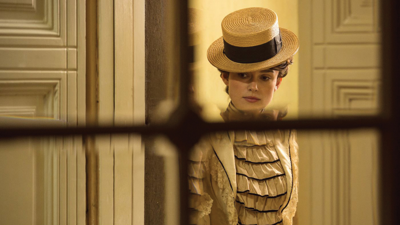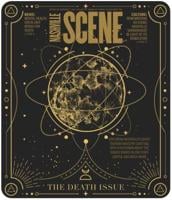
Wash Westmoreland’s magnetic historical drama, Colette, tells the story of Sidonie-Gabrielle Colette, the revered French author, feminist and trendsetter who penned the Claudine series under her husband’s name. The film revels in Belle Epoque elegance and the changing social conventions of the time, while speaking to current conversations about gender representation in the arts. With strong central performances from Keira Knightley as Colette and Dominic West as her literary-charlatan husband Willy, Colette is a ton of fun.
It begins in the French countryside in the 19th century, with young Colette in a yellow frock á la Little Women, frolicking through the gardens of Burgundy. But like a refined dinner guest who slips her tongue in your ear by the second course, the movie Colette reminds us that appearances can be deceiving — the film quickly pivots to a delightful, bawdy affair.
As she climbs the social ladder of Parisian society, Colette doesn’t have to make a lot of noise to turn heads, and Knightley shows us she could play a demure wifey if she wanted to. But the role of Colette calls for an energy that is much harder to pull off. Even in her high-collared conservative dresses, Colette is frank and honest with her sexuality. Even so, she initially acquiesces to her husband’s wishes, and she embraces the challenge of revising her homesick musings into a novel suitable for publication. “More spice, less literature,” Willy directs, and she complies.
“I don’t need to leave my mark on the world,” Colette says early on. As Willy earns recognition and demands that she continue the Claudine series, Colette becomes emboldened, demanding her due. Knightley, whom many first met as the Pirates of the Caribbean damsel in distress Elizabeth Swann 15 years ago, fully inhabits Colette’s sexual freedom, flouting gender stereotypes and rejecting Willy’s “boys will be boys” excuse for infidelity — and all in a corset.
But the Willy-ness of the film is both a strength and shortcoming. He’s the lens through which we see Colette, his gaze cloying and desperate — and at times aloof, at least when there’s another woman in the room. With his curly moustache, graying beard and hefty gut, West brings out a macho magnetism in the character — gone is the scowl we saw West deliver as The Wire’s Jimmy McNulty, even if the lack of self-awareness remains. He’s bombastic, instigating a kick line on a dining table; he’s cruel, locking Colette in a room and ordering her to write; and he’s always, as a high-society cohort cautions Colette early on, “slippery as an eel.” And even though it’s kind of gross, Willy’s sexual appetite makes him ... well, kinda sexy.
Perhaps it’s impossible to separate Colette from the male gaze, but I can’t help but wonder how a female director would frame the character. Even her lesbian love affairs are enacted in relation to Willy — he’s titillated by New Orleans damsel Georgie (Eleanor Tomlinson), and put off by the aristocrat Missy (Denise Gough), who dresses in men’s clothing and presents as masculine. There’s a story in Colette and Willy’s marriage and in the scandal of Claudine’s authorship. But why not tell that story with a woman at the helm? “It’s the hand that holds the pen that writes history,” Willy tells Colette. The same is true in film. I long for narratives about historical women that are framed by their talent, their greatness — not by the men who supported or exploited them.
But there’s much to love about Colette. Production designer Michael Carlin’s sets re-create the French countryside and turn-of-the-century Paris with detailed exteriors and lush interiors. In one early party scene, Colette sympathizes with a diamond-encrusted tortoise. The couple’s Paris apartment is a series of darkish, smallish rooms that are packed with antiques. Colette and Willy are framed by doors, mirrors and windows, and their changing fortunes are reflected in the state of their quarters. In one scene, as the couple argues, Willy takes a piss in the bathroom with the door open — hardly an oddity among married couples — but it signals a sense of claustrophobia for Colette, an inability to escape her demanding husband.
It’s these details that make the movie so much fun. And in the wake of the Kavanaugh Supreme Court confirmation hearings, when more women than ever are saying #MeToo, we need some fun. With strong lead performances and a smart script, Colette goes down like a hot toddy to soothe a weary feminist soul.





